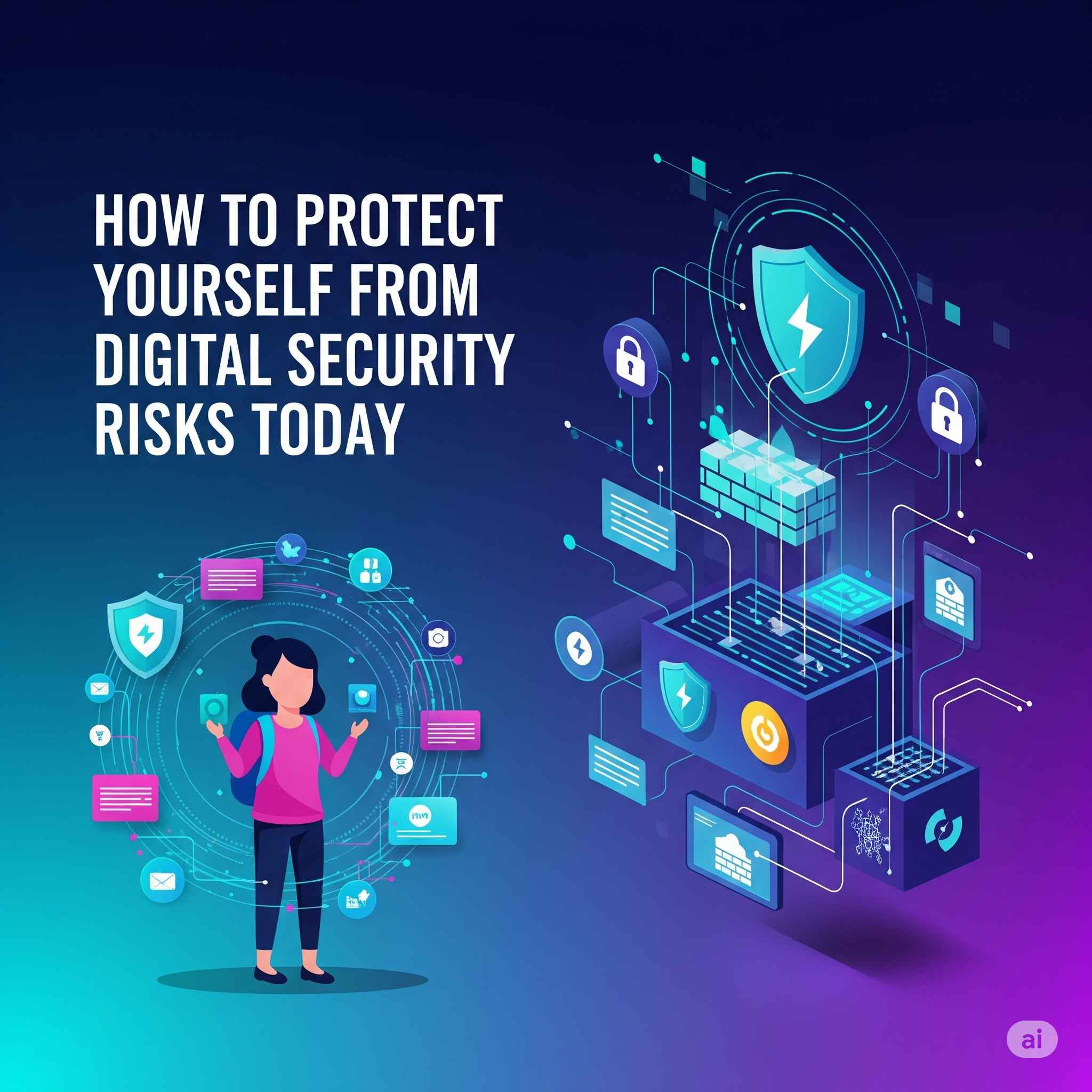
How to Protect Yourself from Digital Security Risks Today
- By: Admin
- Scam
- 0 comment
Introduction
Digital threats are everywhere. Your smartphone, social media accounts, email inbox, and web browser have become prime targets for cybercriminals. Every click, download, and login can expose you to serious security vulnerabilities. Leading to Cyber Crime, and other formal admiration.
Modern digital life is built on convenience, but this convenience comes with hidden dangers. Personal data is harvested daily. Financial information gets stolen through sophisticated scams. Identity theft occurs through seemingly innocent app downloads.
Major Digital Security Risks You Face Daily
App-Based Security Threats
Mobile applications pose significant risks to your digital safety. Malicious apps are disguised as legitimate software to steal personal information.
Common App Security Risks:
|
Risk Type |
Description |
Impact Level |
|
Data Harvesting |
Apps collect excessive personal information |
High |
|
Malware Installation |
Infected apps install harmful software |
Critical |
|
Fake App Stores |
Counterfeit apps mimic legitimate ones |
High |
|
Permission Abuse |
Apps request unnecessary device access |
Medium |
|
Unsecured Data Storage |
Personal data stored without encryption |
High |
Banking apps, gaming platforms, and productivity tools are frequently targeted. Fake versions of popular apps are distributed through unofficial channels. These malicious copies can access your contacts, photos, and financial information.
Social Media Platform Vulnerabilities
Social platforms have become goldmines for cybercriminals. Personal information is freely shared, making users vulnerable to various attacks.
Social Media Security Risks:
- Profile Scraping: Personal details are collected for identity theft
- Phishing Attacks: Fake links lead to credential harvesting sites
- Social Engineering: Criminals manipulate users through fake personas
- Data Breaches: Platform vulnerabilities expose millions of accounts
- Malicious Links: Infected URLs spread through posts and messages
Privacy settings are often inadequate. Default configurations favor data collection over user security. Personal information is sold to third parties without explicit consent.
Email Security Threats
Email remains a primary attack vector for cybercriminals. Sophisticated phishing campaigns target both individuals and businesses.
Email-Based Attack Methods:
|
Attack Type |
Method |
Prevention |
|
Phishing |
Fake emails requesting credentials |
Verify sender identity |
|
Ransomware |
Malicious attachments encrypt files |
Scan all attachments |
|
Spear Phishing |
Targeted attacks using personal info |
Be cautious with personal details |
|
Email Spoofing |
Fake sender addresses |
Check email headers |
|
Business Email Compromise |
Impersonation of executives |
Verify requests through alternate channels |
Email attachments can contain destructive malware. Links in emails often redirect to fraudulent websites. Sensitive information is requested through convincing fake messages.
Web Browsing Dangers
Internet browsing exposes users to numerous security threats. Malicious websites can infect devices and steal sensitive information.
Web Browsing Security Risks:
- Malvertising: Infected advertisements deliver malware
- Drive-by Downloads: Automatic malware installation without user knowledge
- Fake Websites: Counterfeit sites designed to steal credentials
- Unsecured Connections: Unencrypted data transmission
- Browser Vulnerabilities: Outdated software with security flaws
Public Wi-Fi networks amplify these risks. Unencrypted connections allow attackers to intercept data. Man-in-the-middle attacks can compromise sensitive information.
How to Protect Yourself from Digital Threats
1. Essential App Security Measures
Your mobile device needs robust protection against malicious applications. These strategies will significantly reduce your risk exposure.
2. Download apps only from official stores. Apple App Store and Google Play Store have security screening processes. Third-party app stores often host malicious software without proper verification.
3. Review app permissions carefully. Camera apps shouldn't need access to your contacts. Flashlight apps don't require location services. Excessive permissions indicate potential security risks.
4. Keep apps updated regularly. Security patches are released frequently to fix vulnerabilities. Automatic updates ensure you receive critical security fixes promptly.
5. Use app security scanners. These tools identify potentially dangerous applications on your device. Regular scans help detect malware before it causes damage.
6. Social Media Protection Strategies
Social platforms require careful privacy management. Your personal information needs protection from both criminals and data collectors.
7. Strengthen privacy settings immediately. Limit who can see your posts, photos, and personal information. Restrict friend requests from unknown individuals. Disable location sharing features.
8. Be cautious with personal information sharing. Birth dates, addresses, and phone numbers should remain private. This information is used for identity theft and social engineering attacks.
9. Verify friend requests carefully. Fake profiles are created to gain access to personal information. Check mutual connections before accepting requests from strangers.
10.Use two-factor authentication. This adds an extra security layer to your accounts. Even if passwords are compromised, accounts remain protected.
Email Security Best Practices
Email protection requires vigilance and proper security measures. These practices will protect you from most email-based threats.
Enable spam filtering. Most email providers offer robust spam protection. These filters block suspicious messages before they reach your inbox.
Verify sender identity before clicking links. Hover over links to see actual destinations. Legitimate organizations don't request sensitive information via email.
Use encrypted email services. End-to-end encryption protects message content from interception. Consider services like ProtonMail for sensitive communications.
Never download unexpected attachments. Malware is commonly distributed through email attachments. Scan all files with antivirus software before opening.
Safe Web Browsing Techniques
Internet browsing requires security awareness and proper tools. These measures will protect you from web-based threats.
Use reputable browsers with security features. Chrome, Firefox, and Safari offer built-in security protections. Enable automatic security updates for maximum protection.
Install ad blockers and script blockers. These tools prevent malicious advertisements and scripts from running. They significantly reduce malware infection risks.
Verify website security before entering sensitive information. Look for HTTPS connections and valid security certificates. Avoid entering personal data on unsecured websites.
Use VPN services on public networks. Virtual private networks encrypt your internet connection. This protects your data from interception on public Wi-Fi.
Advanced Protection Strategies
Multi-Factor Authentication Implementation
Multi-factor authentication adds crucial security layers to your accounts. This protection method requires multiple verification forms before granting access.
Authentication Methods:
|
Method |
Security Level |
Convenience |
|
SMS Codes |
Medium |
High |
|
Authenticator Apps |
High |
Medium |
|
Hardware Tokens |
Very High |
Low |
|
Biometric |
High |
Very High |
Regular Security Audits
Periodic security reviews help identify vulnerabilities before they're exploited. These audits should be conducted monthly for optimal protection.
Audit Checklist:
- Review app permissions and remove unused applications
- Check privacy settings on all social media platforms
- Update passwords for critical accounts
- Verify two-factor authentication is enabled
- Scan devices for malware and suspicious activity
Emergency Response Planning
Security incidents require immediate action. Having a response plan minimizes damage and speeds recovery.
Immediate Response Steps:
- Disconnect affected devices from internet
- Change passwords for compromised accounts
- Contact financial institutions about potential fraud
- Document the incident for potential law enforcement
- Restore data from clean backups
Frequently Asked Questions
Q: How often should I update my passwords? A: Critical account passwords should be updated every 3-6 months. Use unique passwords for each account and consider a password manager for security.
Q: Are free VPN services safe to use? A: Free VPN services often have security limitations and may log your activity. Paid services typically offer better security and privacy protection.
Q: What should I do if I clicked a suspicious link? A: Immediately disconnect from the internet, run antivirus scans, and change passwords for sensitive accounts. Monitor accounts for unusual activity.
Q: How can I tell if an app is legitimate? A: Check developer information, read reviews, verify permissions, and download only from official app stores. Research the company before installation.
Q: Is public Wi-Fi safe for online banking? A: Public Wi-Fi should never be used for banking or sensitive transactions. Use mobile data or a VPN if public Wi-Fi is necessary.
Q: How do I recognize phishing emails? A: Look for spelling errors, generic greetings, urgent language, suspicious links, and requests for personal information. Verify sender through alternate channels.
Q: What information should I never share on social media? A: Never share full birth dates, addresses, phone numbers, financial information, travel plans, or photos of identification documents.
Q: How can I protect my children online? A: Use parental controls, educate them about online dangers, monitor their activities, and establish clear rules about internet usage and information sharing.
Digital security requires constant vigilance and proactive measures. Your personal information, financial data, and privacy depend on the security practices you implement today. Regular updates, careful browsing habits, and security awareness will protect you from most digital threats.
Remember: security is an ongoing process, not a one-time setup. Stay informed about new threats and adjust your protection strategies accordingly.
Offical Secured Nepali Legal Directory: Nepal Lawyer





















